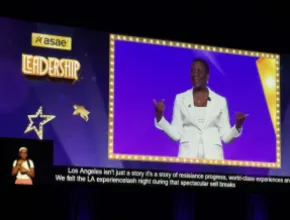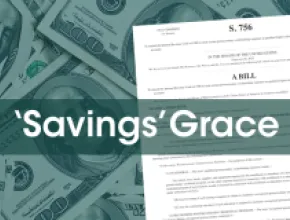Faced with declining staff positions and membership, associations are increasingly turning to third parties for help with event planning as well as with meetings management and procurement practices. At the same time, there is also potential cost saving.
Traditionally, many association managers have been reluctant to go outside their organizations for assistance with meeting planning, worried they would lose control over the membership experience or encounter unethical financial situations. This is changing.
Increasingly, association managers are realizing that procurement and management specialists can often save them from attrition headaches and other predicaments. It’s the partner advocacy they value most.
Third party meetings and event companies such as HelmsBriscoe, ConferenceDirect and Experient have clout in the marketplace because of their volume buying power. Many of them bring more business than any one organization can to hotels and other entities that comprise procurement needs.
Outsourcing Trends
"There is definitely a trend toward outsourcing," says Bron Prokuski, CAE, vice president of business operations for the National Defense Industrial Association. "Many associations have had a financial downturn in the past couple of years, so they have cut staff. Maybe their membership is decreasing, too, so they are looking at ways they can leverage remaining resources."
Prokuski says he has turned to HelmsBriscoe for help because his annual meeting and workshop events can best be handled by an outside source that has the core competencies he needs.
"It makes no sense to try and run a three-day event for 20,000 people with two or three staff people," he says. "Associations are about building the member experience and value, so we need to concentrate on that."
According to Prokuski, the fact that third parties can often pull the association out of a problematic situation is a huge advantage.
"It’s great to know they can step in for you and provide a protective service, look out for your interests with suppliers, and so on," he says.
Becca Dietrich, an account executive with Association Management Strategies, says one of her association clients in the energy sector decided to work with Experient for a first-time September conference in Washington, D.C. The conference, for which planning started just nine months in advance, is for about 1,000 people.
"We had already contracted the meetings site, but Experient is doing the housing, marketing, website design and management, registration and onsite logistics," she says. "So our piece is really developing agenda and invitations. It’s a coordinated effort and we aren’t giving up control.
"Third parties don’t seem to have the stigma they may have had at one time," she continues. "Associations have been going through hard times, so they are now looking at how they can leverage what staff remains. This has led to more outsourcing."
Bargaining Clout
Associations have less bargaining power with hotels and other suppliers than they used to, says Leigh Wintz, executive director for Soroptimist International of the Americas.
"Because attendance is down, all those contracts we negotiated two to three years ago need new negotiating, and a third party is in a much better bargaining position than I am. Our staff is overworked and when we outsource, we free up time for our meeting planners to do strategic marketing activities that need to be done in-house.
"Some association planners may still have the attitude that third parties can’t get a better deal than they can, that bargaining is part of their job," Wintz adds. "But using third parties costs nothing and they provide a helpful service. So why wouldn’t you?"
The past couple of years have seen a critical change in relationships between third party companies and hotels, she adds.
"There’s an uneasy alliance between them," she says. "In the past, hotels wanted their beds filled but they were used to the old business model in which they dealt directly with the client. Now, because of the volume third parties can direct to them, they have more clout to revise contracts and smooth out attrition pieces. They are booking so many rooms with the major chains that no association can compete."
Her association will use about 3,500 room nights for its annual meeting—a fairly good chunk of business, but no comparison to how much business a third party company can offer a supplier.
Rick Binford, executive vice president event management services for Experient, says the economic recession has given third parties a bit of a windfall in that more associations have sought help.
"Last year was very tough for many organizations with respect to meetings," Binford says. "So we were very successful in acquiring a lot of new clients because those same organizations were forced to make a lot of major changes very quickly."
Supporting organizations with meetings risk management skills is what Experient does well, he adds.
"The recession has really impacted associations, and their boards have had to look really hard at costs," Binford says. "They’ve realized they need to focus on core competencies that are unique to associations in delivering value to members. Outsourcing functions like meetings management and procurement, registration and housing is stuff that is not unique to associations. So they have realized they can maximize efficiencies by concentrating on what brings in and holds members.
"We carry a pretty big stick for clients in driving the best value when it comes to things like negotiating huge attrition bills and providing buying power," he says.
Partnership Advocacy
Prokuski is one association executive who values the partnership role third party companies can play, but says that achieving the partnership benefit requires work up front.
"I don’t just look at them as a service provider, that is shortsighted," he says. "Our first consideration is whether they really understand our business model and how can they meet our needs. We want it to be a long-term partnership that is beneficial to both parties, with shared responsibilities."
Achieving a good partnership for the duration requires lots of due diligence, he advises. He says an association must define its requirements and needs and then look ahead to what value they expect. If associations don’t practice due diligence, including researching the background of organizations they do business with, they can pay a price.
"This is what lurks in the background of doubt from other years about using third parties," Prokuski says.
David Scypinski, senior vice president for ConferenceDirect, says it’s usually association executives, not meeting planners, who see value in third party alliances.
"Some association planners remain suspicious about third party companies," he says. "They think we are out to take their jobs. So we talk to executives who usually think more strategically, those who realize there are many things they can’t know."
He adds that ConferenceDirect plays an especially valuable role in helping associations deal with suppliers.
"Our job is to be their [association] advocate, especially with hotels," he says. "If you look under the hood of many hotels, you’ll still see a lot of bad. Bankruptcies aren’t supposed to peak until 2011, so the main thing we try to convey to the end user is that we can help them in the marketplace. We know which properties are fragile. Likely they don’t. No matter how good their organization is, it’s unlikely they book 200,000 room nights a year with anyone."
Further to his point, Scypinski says ConferenceDirect booked 2.1 million room nights in 2008 and 1.8 million in 2009. The company is on track to book 2.2 million room nights this year.
"Associations really cannot afford not to use us," he says. "We are big and we have power in the marketplace they don’t have. We can get them out of problems."
Prokuski agrees.
"The third party advantage is that they represent a wide client base and have good leverage and buying power with hotels and CVBs," he says. "If something happens and you have a problem with your event, there’s a protective service behind you who is looking after your interests."
Promoting the advocacy role is what HelmsBriscoe is doing to win more associations over to the idea of outsourcing.
David Peckinpaugh, CMP, vice president of business development for HelmsBriscoe, was appointed earlier this year to pump up his company’s association business. One of his first moves was to appoint an association advisory board to get "customer-driven feedback" about HelmsBriscoe’s association advocacy plans.
"We are seeking their input about how we can operate more efficiently and give organizations a maximum return on meetings," he says.
HelmsBriscoe has had a 20 percent association to 80 percent corporate business mix in the past, but Peckinpaugh intends to change that.
"My personal goal is to double the amount of association business in the next two years," he says.
As a company, HelmsBriscoe is poised to take advantage of the trend for third party representation. Even in the tough year of 2009, HelmsBriscoe’s 1,200 associates worldwide booked $503 million in group business—18,000 programs and 3 million room nights. The company says it represents the largest single source of group business for InterContinental Hotels Group, Hilton Worldwide, Marriott International and Starwood Hotels & Resorts.
Besides adding to its human capital, the company also has made new investments in technology and training, such as the installation of Cvent as its site-sourcing and online RFP provider, a system that associates say is more intuitive than the previous system they used.
What It Costs
Most third party companies rely on a 10 percent commission from suppliers such as hotels. They offer additional fee-based services for housing and meetings logistics.
But the biggest value for associations is likely not what falls to the bottom line. It’s the support they bring to the table in managing risk and pulling organizations out of problems.
"People used to be suspicious of third party companies, but hotels aren’t going to trifle with a big customer," Scypinski says. "We have a lot of sophisticated tools to be sure they don’t tinker with that. We tell associations we are free to you, we are your advocate—why not use us?"






